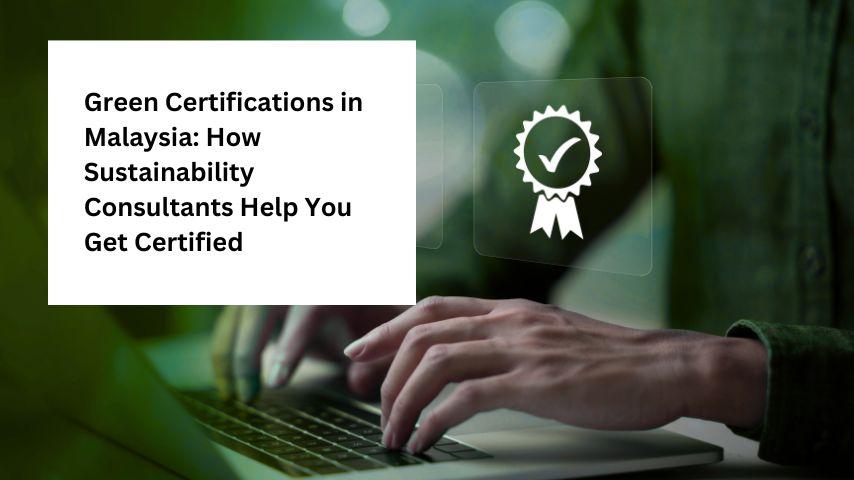Green Certifications in Malaysia: How Sustainability Consultants Help You Get Certified

Sustainability has become a central focus for businesses worldwide, and Malaysia is no exception. Across industries, companies are increasingly seeking to align their operations with environmentally responsible practices. A key part of this shift is the pursuit of green certifications, which validate a company’s commitment to sustainability and provide a competitive advantage in an environmentally conscious market. Green certifications like the Green Building Index (GBI), MyHIJAU, and others not only benefit the planet but also elevate brand credibility and compliance with government regulations.
The process of earning these certifications can be intricate, time-consuming, and highly technical. This is where sustainability consultants play a critical role, guiding businesses in navigating requirements, implementing eco-friendly strategies, and achieving these coveted certifications. This article explores the landscape of green certifications in Malaysia, their significance, the challenges of obtaining them, and how sustainability consultants bridge gaps to streamline the process.
What Are Green Certifications in Malaysia?
Green certifications are formal recognitions awarded to organizations, buildings, or products that meet stringent environmental standards. These certifications serve as a mark of excellence for sustainable practices and are widely regarded as benchmarks for eco-consciousness.
Prominent Green Certifications in Malaysia
1. Green Building Index (GBI):
The GBI is Malaysia’s premier green building certification. Launched in 2009, it evaluates buildings based on six primary criteria:
- Energy efficiency
- Indoor environmental quality
- Site planning and management
- Materials and resources
- Water efficiency
- Innovation
GBI is particularly focused on reducing carbon emissions and promoting energy efficiency in construction and architecture.
2. MyHIJAU Mark:
Introduced by Malaysia Green Technology Corporation (MGTC), this certification identifies products and services that meet global green standards. MyHIJAU is valuable for businesses looking to distinguish their eco-friendly offerings, as it is recognized by both government bodies and environmentally conscious consumers.
3. Energy Commission's Energy Management Gold Standard (EMGS):
This certification rewards organizations for implementing effective energy management systems based on international best practices.
4. Sirim Eco-Label:
The Sirim Eco-Label ensures that a product or process adheres to environmental standards related to waste reduction, resource preservation, and eco-friendly production technologies.
5. ISO14001 Environmental Management Systems (EMS):
Although it is an international standard, ISO14001 is widely adopted in Malaysia. It helps organizations improve environmental performance through efficient management of resources and reduction of waste.
Why Businesses Pursue Green Certifications
Green certifications are much more than symbolic accolades. They provide tangible benefits, including:
- Regulatory compliance: Many green certifications align with Malaysia’s environmental regulations, ensuring companies meet required sustainability criteria.
- Market competitiveness: Certifications differentiate businesses in crowded markets, appealing to both eco-conscious consumers and investors.
- Cost savings: Energy efficiency and optimized resource management reduce operational expenses over time.
- Corporate reputation enhancement: Certifications improve public and stakeholder perception by showcasing a company’s commitment to sustainability.
The Process of Obtaining Green Certifications
While acquiring green certifications can profoundly impact a business, the path to certification is not straightforward. The process typically involves:
1. Understanding Certification Criteria
Each certification has its own unique framework and assessment guidelines. For example:
- GBI emphasizes building design, energy optimization, and construction materials.
- MyHIJAU focuses on evaluating the environmental performance of products and services.
Businesses need to study these criteria carefully to identify certifications that align with their goals.
2. Conducting Baseline Assessments
Before embarking on any transformations, companies must evaluate their current environmental impact. This process helps identify strengths, weaknesses, and areas requiring immediate improvement.
3. Implementing Eco-Friendly Practices
Organizations invest in greener technologies, improve waste management systems, introduce energy-efficient practices, and train teams on environmental compliance standards.
4. Documentation and Reporting
Green certifications require thorough documentation and evidence of sustainability efforts. Meticulous record-keeping of initiatives, investments, and measurable improvements plays a key role in the certification process.
5. Third-Party Audit
Once all prerequisites are fulfilled, an audit is conducted to verify compliance with certification standards. Auditors may visit premises, review operational processes, and interview staff as part of their evaluation.
6. Receiving Certification
Upon successful audit approval, the certification is awarded. However, most certifications are not lifetime guarantees—organizations are often required to renew or maintain standards periodically.
Challenges Faced by Businesses in Green Certification Processes
Despite the benefits, achieving green certifications in Malaysia is not without its hurdles. Common challenges include:
- Complexity of compliance: Many certification processes involve technical knowledge and extensive documentation that overwhelm businesses unfamiliar with sustainability frameworks.
- Upfront costs: Initial investments in green technology, audits, and consultancy fees can be substantial, which discourages smaller enterprises from pursuing these certifications.
- Awareness gaps: Some companies remain unaware of certifications relevant to their industry or the advantages these recognitions offer.
- Navigating overlapping certifications: With multiple certifications available, businesses often struggle to determine which aligns best with their operational goals.
The Role of Sustainability Consultants in Green Certification
Strategic sustainability consultants provide expert guidance to businesses, helping them adopt eco-friendly practices and achieve green certifications efficiently. Here’s how they contribute to the certification process:
1. Strategic Consulting and Goal Alignment
Sustainability consultants assess the current state of a business and recommend certifications that best match its long-term objectives. For example, a manufacturing firm aiming to minimize its carbon footprint might benefit most from MyHIJAU or ISO14001 certifications.
2. Compliance Expertise
Consultants simplify the compliance process by interpreting complex criteria and tailoring solutions to meet certification requirements. They also ensure businesses comply with Malaysian green technology policies.
3. Streamlined Implementation
From planning green facility upgrades to integrating energy-efficient technologies, sustainability consultants develop implementation roadmaps that minimize disruptions to operations.
4. Conducting Training Programs
One of the overlooked aspects of green practices is staff training. Consultants organize workshops to help employees better understand sustainable processes and actively participate in meeting certification criteria.
5. Audit Preparation
By preparing businesses for third-party audits, consultants ensure all requirements are met and reduce the risk of rejection.
The Growing Demand for Green Certifications in Malaysia
Malaysia is making strides toward achieving its climate change goals as part of the Paris Agreement and the national Green Technology Master Plan 2017-2030. Consequently, the green certification landscape is expected to grow.
Government Incentives
To encourage adoption, the Malaysian government actively promotes green certifications. Tax incentives, grants, and subsidies are available for businesses pursuing certifications like MyHIJAU or participating in green building retrofitting schemes.
Corporate Social Responsibility (CSR)
Green certifications align with growing CSR trends, where businesses are under pressure to integrate sustainability into their core operations and report on environmental impacts transparently.
Consumer Trends
Eco-consciousness among Malaysian consumers is increasing, with customers gravitating toward sustainable products and services. Businesses leveraging certifications as proof of environmental stewardship are better positioned to cater to this demand.
Overcoming Barriers and Moving Forward
For businesses intimidated by the process or costs of green certifications, several steps can facilitate the transition:
1. Start Small: Focus on certifications that are affordable and easy to achieve initially. For example, a business can target MyHIJAU for an individual product before pursuing ISO14001 for its entire operation.
2. Leverage Government Support: Seek out financial aids, subsidies, and programs that offer assistance in implementing eco-friendly practices.
3. Invest in Expertise: Collaborating with reputable sustainability consultants like Wellkinetics ensures that no resources go to waste and certification processes are efficiently managed.
Final Thoughts
Green certifications in Malaysia are more than a compliance tool—they are strategic assets enhancing environmental responsibility, brand recognition, and operational efficiency. While the path to certification may seem daunting, the guidance of skilled sustainability consultants can make all the difference. By bridging knowledge gaps, simplifying compliance, and streamlining processes, these experts empower businesses to play their part in addressing environmental concerns.
For business leaders, achieving green certifications is a proactive step toward a more sustainable and profitable future. And, as Malaysia continues prioritizing green growth, companies that invest in sustainability today will be tomorrow’s industry leaders.





